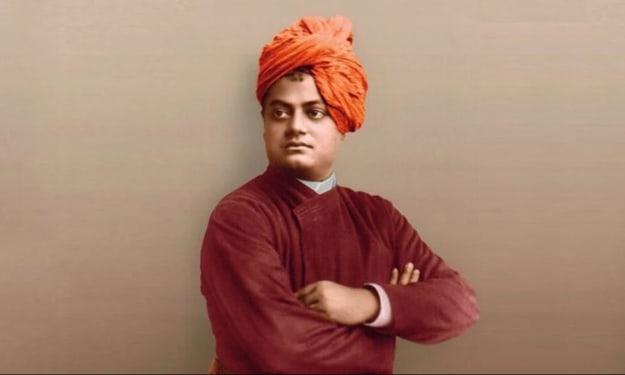Foam on the Ocean and the Foundations of a Feminist Identity
How the little mermaid informed my voice by losing hers

As a girl, I was captivated by the mythical realms presented in fairytales. Through them, I could escape the mundane and transport myself into a world of escape. And no tale held my attention quite the way that Hans Christian Andersen's The Little Mermaid did.
To briefly summarize the famous story: The Little Mermaid longs to be a part of the world beyond her ocean home and gain an immortal soul. On one of her visits to the surface, she saves a drowning prince and falls in love. She seeks the aid of a Sea Witch who makes her a potion that gives her legs in return for giving up her voice and a life of unending pain. She can never return to the ocean, and if the prince marries someone else, The Little Mermaid will die of a broken heart at dawn and return to foam on the ocean.
When this marriage does happen, despite the prince declaring his love, The Little Mermaid's sisters give her another option to death. If she kills the prince with a magical dagger, she can return to her life as a mermaid. But she cannot take his life. Her body then dissolves into foam on the ocean, but she soon discovers that she still exists, as a spirit of the air—because of her selflessness she is rewarded with a chance to gain an immortal soul by serving humanity with good deeds as a spirit for 300 years.
The little mermaid embodies female power in a society that disarms and mutes us. She decides her own destiny within the confines of a patriarchal world. Her liberation is dependent first on a man and then on her 'goodness'. This fact is infuriating but beyond her control. Here fiction echoes life.
Women are socialized from an early age to believe that our happiness lies in the arms of men. And we are socialized to understand our primary virtues to be those of self-sacrifice and caretaking, especially for our eventual children and husbands. A 'good' woman puts others first. The Little Mermaid starts out following her own desires but ends up letting them go. It is only in letting them go that she receives true liberation. This is a problematic trope for a children's tale written for young girls, but it's not surprising. She was, after all, written by a male author in the 1800s.
In addition, women are taught not to speak of our pain. Our pain is meant to be our salvation and held stoically and with gratitude. When in labour, I was afraid to vocalize for fear of being seen as a weak woman. This is not uncommon. The Little Mermaid was in excruciating pain every step of her earthly life, and yet, she danced for the prince as if nothing was wrong. The sea was a primordial womb of sorts—a holding place from before her story really began. It was painless. But life with two legs, and presumably what is between them is characterized by pain. And it is that pain that gives 'fallen' women the chance at immortality in our patriarchal society.
Human life, for women, is seen as pain—this is a certainty of literature since Eve first exited the garden of Eden. The Little Mermaid serves as an anecdote of sorts to Eve. Eve's curiosity led her from salvation and towards pain—her only chance to gain immortality coming from her pain of childbirth and from a man. She must give birth to secure the continued existence of humanity until one day her descendent births a man—Jesus—who restores immortality to all humanity and retrospectively to Eve herself.
The story of The Little Mermaid mirrors that of Eve. She too exists in a painless ocean garden, and she too tastes the forbidden fruit when she takes the potion. She is also barred from ever returning to her place of origin. And she, like Eve, must subsist in pain and erasure in order to gain her chance at salvation.
But unlike Eve, The Little Mermaid is ultimately her own saviour figure. She is given the chance that was only given to Eve's male descendent—to sacrifice her life for immortality. The catch is that she doesn't know that is what she will obtain. Her sacrifice is ultimate. She must sacrifice both the chance of an earthly and immortal life to save the mortal life of the man she loves but who did not love her back enough to marry her.
The Little Mermaid loses her voice to follow her dream of love and immortality. She manages to captivate the prince all the same with her dancing, but she cannot directly communicate with him—being vocal all her life, her voice is the only way she knows how to communicate herself. He is charmed by her body, not her mind. Here too, art mirrors life. There is a misogyny inherent in our patriarchal culture that values women's bodies first and their minds second.
Women's bodies are commodified and often separated from our intellects in the minds of others. There is a narrative that women are either smart or pretty. Men routinely feel ownership over women's bodies, forgetting that there is a mind (a female and equal mind) behind them that already holds total ownership of their bodies. Men often see women's bodies as unmanned and free for their pleasure without consent. Likewise, they see women's minds as disembodied. This allows them to separate the bodies they use for their own pleasure, often without consent from the women they love. This is the foundation of rape culture.
Even as a child I challenged the narrative presented in The Little Mermaid. Why were these her only options? If the power existed to give The Little Mermaid the life she wanted, why must it inherently be tied to the choices of a man? Why does the magic specifically remove her voice and agency so that she has no chance of making the prince fall in love with her, instead of just lusting over her body? Why must the only way for The Little Mermaid to gain life be to give it up? There is misogyny in the magic, and as a child, I could see it. Other children can too.
The Little Mermaid is a tale that upholds patriarchal values. The catch is that it does this by centring a woman and in doing so female readers have an in to question the narrative, and that is exactly what I did. While The Little Mermaid lost her voice, I used mine to ask the questions she could not and thereby gain my feminist voice. Hans Christian Andersen's The Little Mermaid is an excellent tale to be used as a starting point for discussion with children on society's treatment of women and girls.
Julia Marsiglio is a Canadian author who writes poetry, fiction, and non-fiction exploring topics such as trauma, grief, mental health, marginalization, and neurodivergence.
About the Creator
Julia Marsiglio
Loss parent. Canadian poet. Fiction and nonfiction writer. Intersectional feminist. Writing on trauma, grief, mental health, marginalization, neurodivergence and more.






Comments
There are no comments for this story
Be the first to respond and start the conversation.